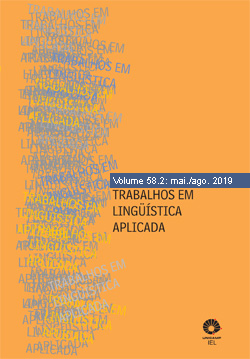Abstract
This paper purports to present some characteristics of the posthuman perspective and relate them to contemporary understanding of applied linguistics and literacy studies with preliminary activities in this direction and interrogations for future studies. As interdisciplinary studies, posthumanism draws on Deleuze and Guattari's notion of assemblage (2005) and has been gaining relevance according to theorists such as Barad (2007), Bennet (2010), Braidotti (2018) and Pennycook (2018), among others. One of their concerns is the future of language research, teaching, learning and enacting in philosophical, transcultural and educational ways. Barad (2007) and Bennet (2010)) use the terms humans and nonhumans while Braidotti (2018) and Pennycook (2018) write humans and non-humans. At times, Bennet (2010) prefers human-nonhuman(s) to emphasize the idea of assemblage. They consider such agents in vibrant interconnected assembles within a broader range of semiotic, spatial and ethical complexities in the emergence of posthuman humanism as Braidotti (2018) argues. This calls for applied linguistics and literacy studies willing to recognize that they themselves are products of such entanglements for which a revision of ontologies influencing epistemologies and methodologies might be productive.
References
BARAD, K. (2007). Meeting the universe halfway: quantum physics and the entanglement of mater and meaning. Durham, N.C.: Duke University Press.
BARAD, K. (2012). “Intra-actions” (interview of Karen Barad by Adam Kleinmann). Available at: <https://www.academia.edu/1857617/_Intra-actions_Interview_of_Karen_Barad_by_Adam_Kleinmann.> Access on: December 10 2018.
BARAD, K. (2003). Posthumanist Performativity: Toward an Understanding of How Matter Comes to Matter. Available at: <https://www.uio.no/studier/emner/sv/sai/SOSANT4400/v14/pensumliste/barad_posthumanist-performativity.pdf>. Access on: January 15, 2019.
BRAIDOTTI, R. (2018). The posthuman. Cambridge: Polity Press.
BENNET, J. (2010). Vibrant matter. A political ecology of things. Durham, NC: Duke University Press.
CANAGARAJAH, S. (2013). Translingual practice: global Englishes and cosmopolitan relations. New York, London, Routledge.
DELEUZE, G.; GUATTARI, F. (2005). A thousand plateaus: capitalism and schizophrenia/Gilles Deleuze, Felix Guattari; translation and foreword by Brian Massumi. Minneapolis: Published by the University of Minnesota Press, 2005.
FREIRE, P. (2011). Pedagogia do oprimido. 50ª. ed. Rio de Janeiro: Paz e Terra.
FREIRE, P. (2017). Pedagogy of the oppressed. 50th anniversary edition. Translated by Myra Bergman Ramos. With an introduction by Donaldo Macedo and an afterword by Ira Shor. New York: Bloomsbury Publishing Inc.
HACKETT, A.; SOMERVILLE, M. (2017). Posthuman literacies: young children moving in time, place and more-than-human worlds. Available at: https://e-space.mmu.ac.uk/618199/3/Moving%20in%20time%20and%20place%20FINAL%20%20March%202017%20(4).pdf. Access on: January 15, 2019.
JONES, A.; HOSKINS, T. K. (2016). A mark on paper: the matter of indigenous-settler history. In: TAYLOR, C.; HUGHES, C. (Eds.) Posthuman research practices in Education. New York: Palgrave Macmillan, pp. 75-92.
KRESS, G. (2003). Literacy in the New Media Age. New York, London: Routledge.
LATOUR, B. (2005). Reassembling the social: an introduction to actor-network theory. Oxford: Oxford University Press.
LIVESEY, G. (2010). Assemblage. In: PARR, A. (Ed.) Deleuze dictionary. Revised edition. Edinburg: Edinburg University Press, pp. 18-19.
MIGNOLO, W. (2000). Local histories/global designs. Coloniality, subaltern knowledges, and border thinking. Princetown: Princetown University Press.
MIGNOLO, W. (2010). The geopolitics of knowledge and the colonial difference. Disponível em: <http://waltermignolo.com/the-geopolitics-of-knowledge-and-the-colonialdifference/>. Access on January 17, 2019.
MITHCELL, D. T.; SNYDER, S. L. (2015). The Biopolitics of Disability: Neoliberalism, Ablenationalism, and Peripheral Embodiment. Ann Arbor: University of Michigan Press.
(2018). Posthumanist applied linguistics. New York: Routledge.
PENNYCOOK, A. (2007). A linguística aplicada dos anos 90: em defesa de uma abordagem crítica. In: SIGNORINI, I.; CAVALCANTI, M. (Orgs.) Linguística aplicada e transdisciplinaridade. Campinas: Mercado de Letras.
PENNYCOOK, A.; OTSUJI. E. (2015). Metrolingualism. Language in the city. London, New York: Routledge.
PHILIPS, J. (2006). Agencement/Assemblage. Available at: <http://www.urbanlab.org/articles/Philips%20asse,blages.pdf>. Access on: December 20, 2018.
ROBERTS, T. (2012). From ‘new materialism’ to ‘machinic assemblage’: agency and affect in IKEA. Available at: < https://journals.sagepub.com/doi/10.1068/a44692>. Access on: January 31, 2018, from.
SANTOS, B. de SOUSA. (2018). Para uma nova visão da Europa aprender como sul. In: SANTOS, B. de SOUSA; MENDES, J. M. (Orgs.) Demodiversidade. Imaginar novas possibilidades democráticas. Belo Horizonte: autêntica, 2018, p. 51-72.
SOUZA, L. M. T. (2011). Para uma redefinição de letramento crítico: conflito e produção de significação. Available at: <https://www.researchgate.net/publication/236003625_Para_uma_redefinicao_de_letramento_critico_conflito_e_producao_de_significacao.> Access on: January 19, 2019.
SOUZA, L. M. T. (2005). The ecology of writing among the Kashinawá: Indigenous multimodality in Brazil. In: CANAGARAJAH, S. (Ed.) Reclaiming the local in language policy and practice. Mahwah NJ: Lawrence Erlbaum, pp. 73-95.
TAYLOR, C.; HUGHES, C. (Eds.) (2016). Posthuman research practices in Education. New York: Palgrave Macmillan.
TAYLOR, C. (2016). Edu-crafting a cacophonous ecology: posthumanist research practices for education. In: TAYLOR, C.; HUGHES, C. (Eds.) Posthuman research practices in Education. New York: Palgrave Macmillan, pp. 5- 24.
THORBURN, E. D. (2015). Human-Machinic Assemblages: Technologies, Bodies, and the Recuperation of Social Reproduction in the Crisis Era. Available at: <https://ir.lib.uwo.ca/cgi/viewcontent.cgi?article=4331&context=etd>. Access on: January 13, 2018.

This work is licensed under a Creative Commons Attribution 4.0 International License.
Copyright (c) 2019 Trabalhos em Linguística Aplicada


